In 2023. Freelancers contributed $1.3 trillion to the US economy and 38% of the US workforce freelanced last year.
That kind of scale brings opportunity, but also pressure. When you’re freelancing, you have to be in control of every aspect of your business, and when you’re on your own, it’s easy to lose track of leads, deadlines, or unpaid invoices. A good CRM keeps your work organized – without adding more of it.
This guide walks through CRM tools that actually fit how freelancers work.
Top CRM features freelancers should actually care about
Freelancers don’t need a CRM built for sales departments or 50-person teams. They need a simple way to stay on top of clients, deadlines, and dollars at all times.
Here’s what to look for in a CRM that works as hard as you do.
Affordable pricing
Your income isn’t the same every month, but your tools shouldn’t become unaffordable when work slows down. Look for a CRM with flexible, low-commitment pricing – ideally under $20/month – so it feels like a smart investment, not a subscription you resent.
Capsule, for example, starts at $18/month and gives you the tools you need without locking core features behind a paywall.
Contact and client management
Clients text, email, DM, and leave voicemails. A CRM should help you stitch all that communication into one clear record. Instead of searching Gmail or sticky notes, you should be able to:
- Pull up the full history of a client before a call
- Check when you last followed up
- Track what you agreed on, and what’s overdue
Task tracking that doesn’t require a second tool
You probably don’t need a full-blown project management tool, but you do need to keep tabs on what needs doing, for whom, and when.
Look for CRMs with built-in task lists or easy integrations with tools you already use (like Trello or Asana). Capsule, for instance, connects via Zapier to 2,000+ apps.
Smart follow-up nudges
You win projects when you follow up. A CRM should remind you when to nudge a lead, chase a quote, or follow up on an unpaid invoice. You don’t have to automate your whole pipeline. You just need a system that has your back when things get busy.
Quotes and invoices in the same flow
Getting paid shouldn’t require three different tools! Some CRMs offer built-in quotes and invoicing, so you can go from "nice to meet you" to "here’s your invoice" without switching tabs.
Even if your CRM doesn’t handle billing directly, it should at least work nicely with tools that do – and show payment status alongside client notes, so you know who’s paid and who needs a reminder.
Emails that sync without extra effort
Most freelance business happens via email. A good CRM should connect to Gmail or Outlook, automatically syncing conversations so you're not manually copying threads.
That way, when a client replies to a proposal you sent two weeks ago, you’re not stuck wondering what they’re talking about.
Visual pipelines you can tweak
You may not call it “sales,” but every freelance project has stages: initial message, proposal, signed contract, kickoff.
A CRM with a drag-and-drop pipeline lets you track every opportunity, whether it’s a one-off logo job or a long-term retainer. You should be able to:
- Create your own stages
- See at a glance what’s stalled
- Plan your workload based on what’s likely to close
This helps you smooth out feast-or-famine cycles and forecast what’s coming up.
Mobile access that’s actually usable
Freelancers work from cafes, co-working spaces, client offices, trains… and sometimes, even the couch. You need a CRM that works wherever you are.
Look for one with a mobile app. The desktop version won’t help you when you’re 10 minutes early for a client call and need to refresh your memory.
Flexible fields for your work
Not all freelance work fits into tidy categories. A good CRM lets you make it your own. That means tagging clients by service type, tracking different billing setups, or flagging high-maintenance clients with notes like “prefers WhatsApp over email.”
Custom fields help your system reflect your reality and scale with you as your services evolve.
Top 6 CRM software for freelancers in 2025
Now that you know what to look for, here are seven CRMs that match how freelancers actually work.
Capsule CRM
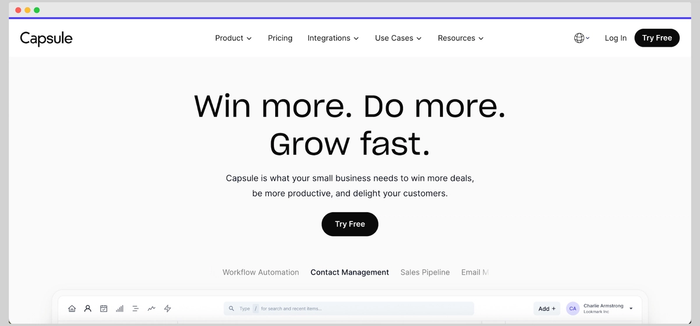
Looking for less chaos and more clarity? Capsule CRM might be exactly what you need.
Managing client projects, chasing leads, and keeping up with every “just checking in” follow-up can feel like a full-time job on top of your actual work. Capsule CRM cuts through the noise, so you don’t have to dig through emails or scribbled notes just to figure out who needs a reply today. Everything lands in one tidy dashboard, so you can spot what’s urgent and what’s not at a glance.
Top features for freelancers
- Custom tags and fields turn your contact list into a living, breathing client tracker – handy when your next gig might come from an old lead.
- Task reminders mean you never let a follow-up go unnoticed, even on those days when client work is all-consuming.
- The sales pipeline isn’t some overbuilt feature – just a simple, visual way to keep proposals and projects moving.
- Projects let you log deliverables or client asks so you always have a record (and never have to rely on memory).
- Built-in integrations mean you can plug Capsule into your existing stack in seconds.
Managing your own sales journey – from first inquiry to “project paid” – doesn’t need to feel like a second job.
What freelancers say about Capsule
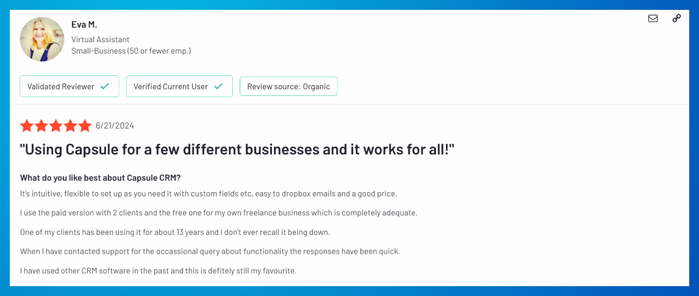
Pricing
You can get started for free if your contact list is under 250. When you need more room (or you want the fancier features), plans start at $18 per user/month, bringing in advanced pipelines, custom fields, and those integrations that save you hours.
Considerations
- Capsule skips the extras, like built-in invoicing or proposal tools, but you can connect almost anything you need through Zapier.
- Capsule is made for freelancers who want clear, simple organization over a complex, all-in-one system – perfect if you value focus and a clutter-free workspace.
HubSpot CRM
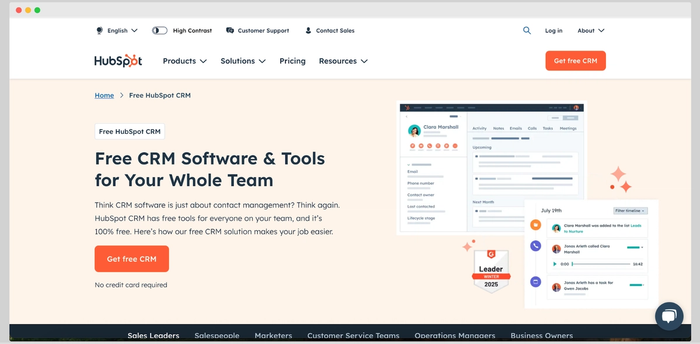
Looking for a free CRM with a broader feature set than most? HubSpot CRM brings in core tools for tracking contacts, managing emails, scheduling meetings, and organizing deals—no credit card needed at sign-up.
Top features for freelancers
- Unlimited contacts and up to a million records
- Email templates, scheduling, and basic tracking built in
- Integrated booking links for meetings
- Timeline view to see all emails, calls, and notes per contact
Pricing
Core HubSpot CRM tools are free, including email tracking and pipelines. Nonprofits and freelancers get 40% off paid plans if more features are needed.
Considerations
- HubSpot’s scale can feel a bit heavy for freelancers who just want something straightforward – trying the free version first is the safest bet.
- Many features are built for larger teams, so freelancers might see options that aren’t especially relevant.
- As you add more advanced features, costs can rise quickly, especially when adding automation or custom integrations outside the free tier.
Bonsai
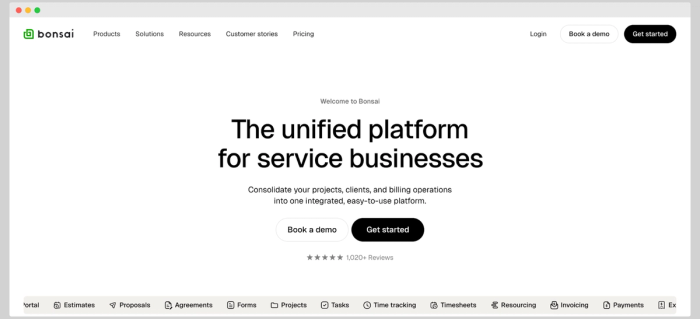
Not every freelancer needs an all-in-one business suite – but if you’d rather have everything under one roof, Bonsai covers most bases. Instead of cobbling together a CRM, invoicing app, and contract tool, you get a platform that handles proposals, e-signatures, invoicing, and tax tracking alongside basic client management.
Top features for freelancers
- Ready-made proposal and contract templates with e-signature
- Project tracking plus simple task lists
- Invoicing with built-in payment reminders
- Basic time and expense tracking
Pricing
Starts at $25/month (billed annually) for access to the full suite. A 7-day free trial is available.
Considerations
- CRM capabilities are on the lighter side—anyone needing deeper pipeline or relationship management will hit limitations faster than with tools like Capsule.
- There’s no free plan, and the trial period may feel rushed if you want to test everything.
- If you already rely on other invoicing or contract tools, Bonsai can end up overlapping with your current setup.
Streak
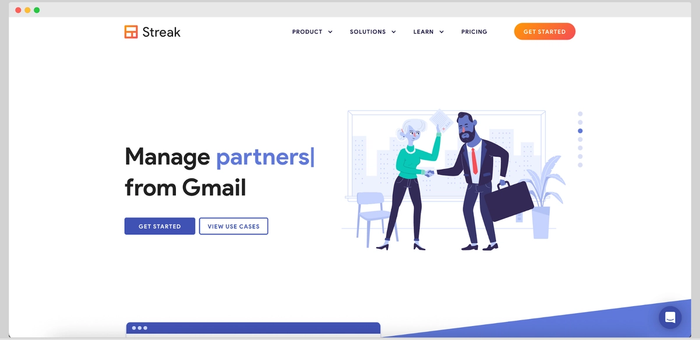
Plenty of freelancers already manage their whole client life from Gmail. Streak simply builds on that habit, weaving lead and project tracking right into your inbox. If your workflow already “lives” in Gmail, using Streak feels like a natural next step.
Top features for freelancers
- Custom pipelines that sit inside Gmail, so you can organize work as you go
- Tag emails to each stage
- Track who’s opened your emails and schedule messages for later
- Save time with templates for common replies
- Basic mail merge lets you send personalized bulk emails
Pricing
The free plan covers core CRM and pipelines. Paid Streak CRM features like mail merge and more advanced customization start at $15/month.
Considerations
- Streak only works in Gmail, so if your work spreads across different channels, it might not keep up with you.
- Tools for invoicing, contracts, or deeper project management are missing – you’ll still need other apps to handle the full sales or project process.
- Some client work inevitably happens outside email; for those cases, a more standalone CRM may offer better visibility.
Zoho CRM
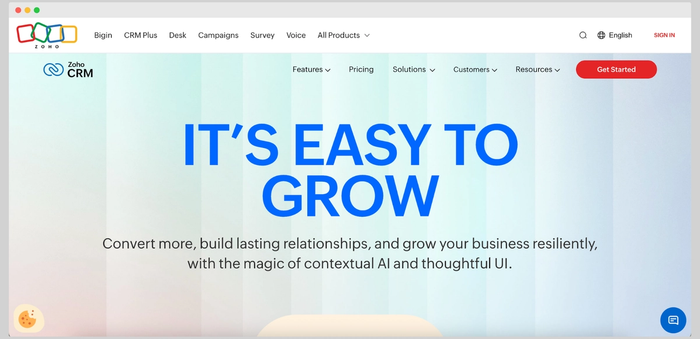
From many freelance CRM choices, Zoho CRM appeals to those who want real control over how they manage their client relationships. It’s a platform built for flexibility, so you can adapt it as your work and processes evolve, instead of outgrowing your system after a few big projects.
Top features for freelancers
- Custom contact profiles let you capture exactly the client info you care about
- Simple automation takes repetitive admin off your plate, like recurring reminders or basic email tasks
- Mobile access means you can update contacts or log activity even between meetings
- Integrates with Zoho’s suite, connecting your CRM with tools for invoicing, project management, and reporting
Pricing
Zoho pricing is freelancer-friendly: free for up to three users, and paid plans with more advanced automation and customization start at $14/month.
Considerations
- The interface favors function over aesthetics.
- There’s a learning curve, especially for freelancers who want something plug-and-play right away.
- Best for freelancers who want to invest in a system that can scale, rather than those seeking a basic, minimal setup.
Nimble CRM
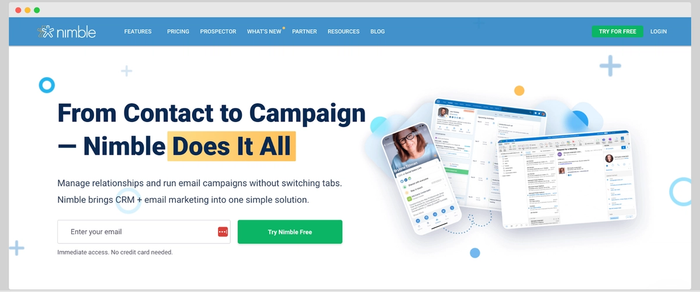
When building your freelance business relies on connections and personal outreach, Nimble CRM stands out for its people-first approach. Instead of treating contacts as just names in a list, Nimble pulls in email history, social profiles, and activity updates—so every conversation starts with context.
Top features for freelancers
- Unified contact profiles blend email, social media, and job details, all in one place
- Automatic enrichment adds fresh info without manual updates
- Group messaging and email tracking
- Handy browser extension lets you add new contacts from platforms like LinkedIn or Gmail in a single click
Pricing:
Nimble CRM pricing starts at $29.90/month (or $24.90/month with annual billing). Handles up to 25,000 contacts and includes full CRM access.
Considerations:
- Nimble’s strength is keeping your network updated and organized, not running complex sales funnels or managing projects in detail.
- It’s best for freelancers who depend on relationship-building and regular outreach. If your focus is on back-office operations or structured sales tracking, you’ll find more value in alternatives like Capsule.
- Pricing is on the higher end compared to some CRM options, so it’s best suited for those who see networking as a business investment.
Conclusion
As freelancing becomes the new normal, with over 90 million people in the U.S. expected to join the ranks by 2028, staying organized makes all the difference. The right CRM doesn’t get in your way or force you into a bloated system: it keeps your projects moving, your follow-ups on point, and your client relationships solid.
Capsule keeps things simple, so you can spend more time doing the work clients actually pay you for. Try it free, and see how a smarter system can give your freelance business an edge.




